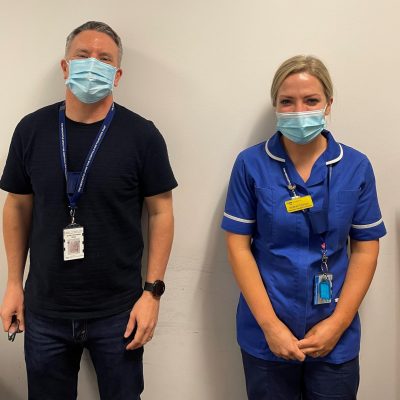A team of Liver Transplant Co-ordinators at the Freeman Hospital have reduced the assessment process for their patients from three days to just one day.
This has led to an improved patient experience, more effective MDTs and reduced the number of beds required in the hospital. Over the last year they have seen:
| Financial Year | Number of bed days used by service |
| 2019-20 | 200 |
| 2020-21 | 7 |
Understanding the Problem
A liver transplant assessment looks at people with chronic liver disease, who are heading towards transplantation. The assessment aims to review whether this is a suitable course of treatment for those patients as timing is critical with transplants – if they are left too late the person would be too unwell for the transplant or if they are too early, they won’t have any real benefit from transplantation.
Traditionally at the Freeman Hospital, the assessment process for liver transplant patients was three days – with numerous tests spanning from Wednesday until Friday afternoon. The team wanted to use improvement techniques to reduce this assessment period to just one day, with no overnight stay.
They began the process by visiting other hospitals in Leeds and Birmingham to study their assessments and how they could learn from them.
Their next step focused on the concept of improving through teamwork – working with both colleagues and patients.
Peter Robinson Smith, Liver Transplant Co-ordinator, said: “We knew we needed to smarten up the process so began by speaking to consultants in Hepatology and Anaesthesia to see how we could work together in a more streamlined way.
“As we looked closely at the assessment period we also realised that we could work smarter – as there were no fixed times for tests. By changing this, so patients have allocated time slots, the process is so much quicker and slicker.
“Most importantly, we knew we needed to speak to our patients and be prepared for all feedback, even if it was difficult to hear. It is only by listening, refining and working together that improvements can be made.”
The team carried out a patient survey and their feedback was very much in favour of reducing the assessment period time, it included:
“I live far away so for convenience it would be better to complete in a day”
“Would prefer not to stay overnight”
“Waste of a bed if all tests can be carried out in one day”
“Would like more coordinated care”
Improvements made
The assessment process for liver transplant patients is now one day. Patients arrive at the Day Treatment Centre at 8.15am then go home at 5pm, with no overnight stays (unless they meet specific exclusion criteria for example additional investigations are required).
All test slots for patients are now at fixed times, which has made it quicker for patients and much easier for staff to manage tests too.
The referral pathway has also been improved. Traditionally, referrals lasted for 10 weeks, which was problematic if new issues arose that were not identified. Now a referral goes direct to a Hepatologist, within 4 weeks. The Transplant Co-ordinator then meets the patient to decide whether an assessment is required and confirm their appointment date.
Additionally, the team has moved to weekly, rather than fortnightly Transplant MDTs, to discuss assessments – which leads to quicker outcomes for patients.
What happens next
The liver transplant team is keen to continually improve the assessment process. They have gone on to make a number of additional improvements, these have included:
- Reviewing ways to reduce time pressures when a patient first arrives
- Introducing a weekly pre-assessment clinic for patients – to help educate them and their family about liver transplants.
The team is keen to maintain this momentum of improvement and will be looking to survey patients again in the near future and also review rehabilitation for patients.
Peter added: “Whilst the improvements we have made so far have had a huge impact, we knew that they would not be perfect straight away so we are always reviewing and updating how we do things.
“I particularly like using the PDSA cycle to think about how we can do things better – and keep going back to review what we are doing and how we could make a number of improvements. We are always learning, evolving and improving – this doesn’t stop here.”
